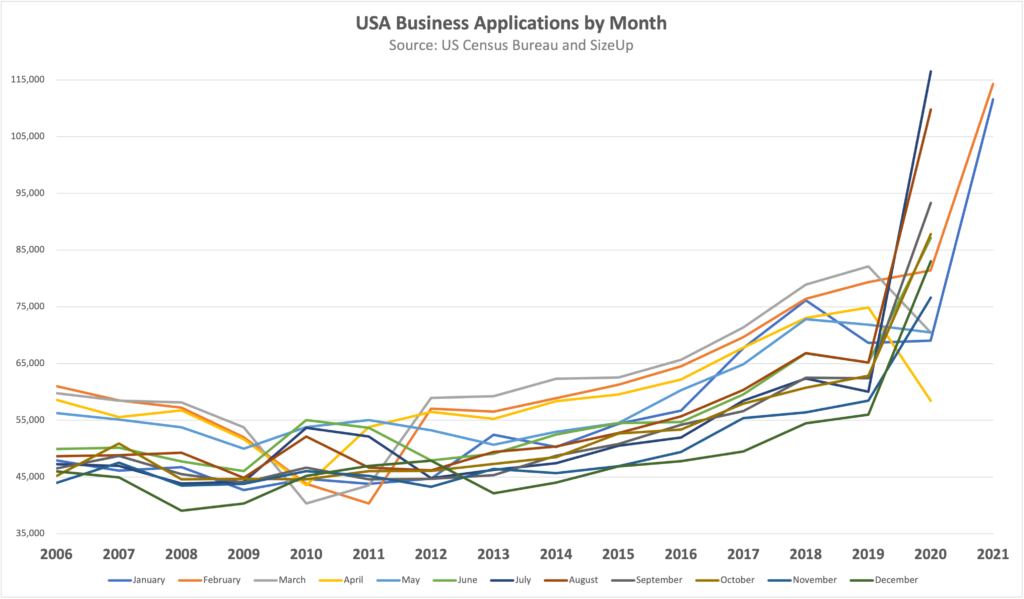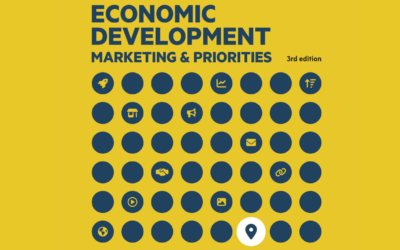
A powerful and transformative economic development event is happening right now but many in the profession aren’t yet aware it is occurring because it requires a nerdy amount of granular data analysis and tracking of federal data sets. What the data shows it there is an unprecedented surge in entrepreneurship that started last year, and which is growing even larger this year. This information is especially timely as new businesses starting are a material solution to replenish local and state economies ravaged by the COVID-19 economic crisis.
As background, the “three legs” supporting economic development have traditionally been existing businesses, attracted/external businesses, and new businesses. Since the onset of the COVID economic crisis:
- Business attraction has plummeted as a source of economic investment. (↓)
- Existing businesses have struggled, and vast numbers of companies are now permanently closed. (↓)
- New business entrepreneurship growth is unprecedented. (↑)
“New business starts” typically follow a similar pattern by fiscal quarter: relatively more businesses start in the earlier fiscal quarters of the year. However, starting in June 2020 (Q2) new business starts started growing at unprecedented rates compared to any of the previous 15 years (and perhaps much longer), including the previous recession and economic rebound. Q3 and Q4 of 2020, which are typically the lowest periods of new businesses starting, were astonishingly higher than anything seen for any and all previous times in the last 15 years.
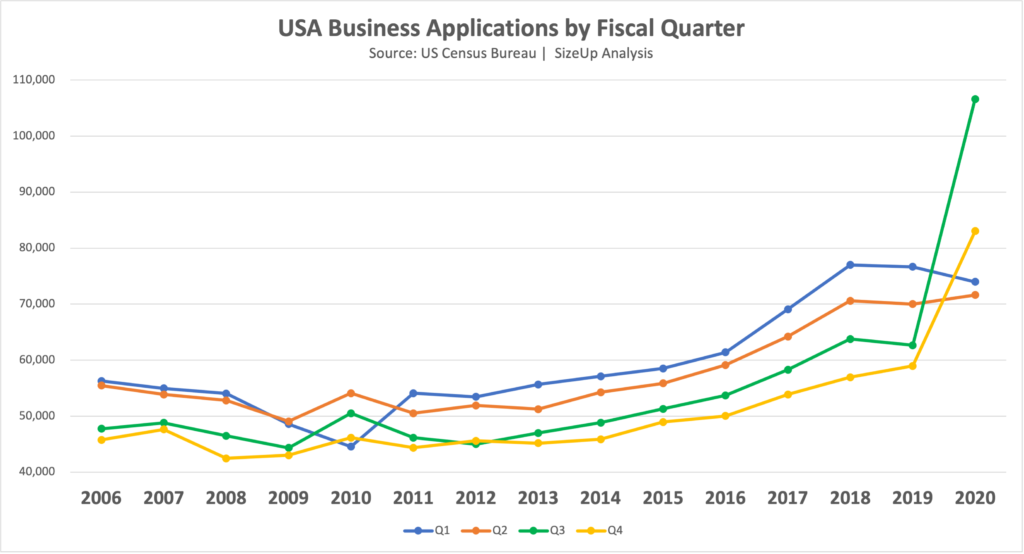
Will the 2020 Trend Continue in 2021?
The extreme growth of new business starts that happened in the second half of 2020 is both known and measured. What is also known is that historically the highest rates of new business starts happen consistently in the first half of each year. This leads to the question as to whether 2021 will follow this trend. IF the same trends from 2020 persist, will the 2021 fiscal quarters of new businesses starting which are typically large, actually be huge?
The March data, which was just released, shows that Q1 2021 has the highest fiscal quarter of new business starts of any quarter since CY 2006. The boom is real and sustaining.
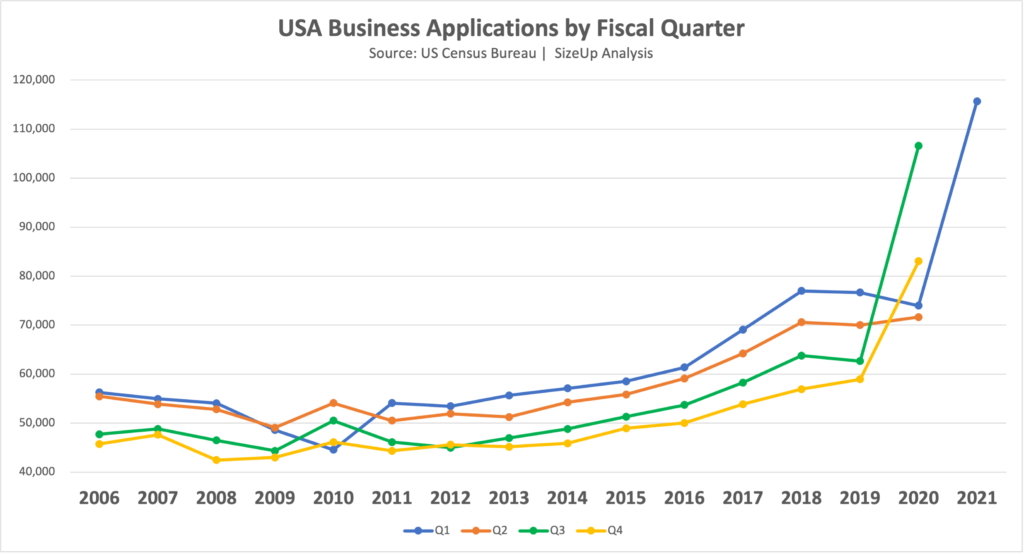
This Isn’t Like the Last Recession
The 2007-2009 recession resulted in a general decline of new businesses starting. In the current recession, for every month since April of 2020, new businesses have not only been starting at higher rates than their same month in the previous year, but higher than their month in the last 15 years. Even May of 2020 had nearly as many new businesses as the previous year.
This shows that for entrepreneurship, this recession isn’t like that last one. Entrepreneurs are not waiting to open businesses until the recession is over; they are opening businesses during the recession and at amounts so large they have never been seen in 15 years, or possibly more.

What Happens to Economic Developers that Miss Out on this Boom Cycle?
The loss of positive economic impact from missing out on this boom in entrepreneurship through new businesses being created will result in long-term economic disadvantages. This is because the businesses that start today as small businesses have the opportunity to grow in the coming years to become medium and large businesses. The businesses that never get started in a community can’t grow, which means the opportunity loss of new jobs, wealth, taxes and other community benefits created by companies.
While it is certain that there will be future economic booms and busts, it may be decades before there is an entrepreneurial boom opportunity like this, especially since there (note: perhaps) hasn’t been one of this magnitude in this century. Also, when the next entrepreneurial boom comes, the communities that take advantage of the current boom can add to what they will have built today and expand it in the future, whereas communities that don’t capture the current boom will be betting on an uncertain and unpredictable future.
The cost to economic developers of missing this boom cycle will be painful for a long time and in stark contrast to the communities where their economic developers maximize this giant entrepreneurial boom.
How Do Economic Developers Turn this Entrepreneurship Boom into Economic Results?
Economic developers can maximize the economic impact of this trend by proactively facilitating the successful starts of new businesses in their communities.
Get More Than Your Fair Share
Communities can organically gain whatever amount of new businesses that happen to open in their area during this current boom which may result in getting their fair share based on the free market. However, if all a community is going to do is get what would happen without intervention, then what do they need economic developers for? The reason they have economic developers is so that their community will have above average economic growth through the proactive work of their economic developers.
Economic developers and communities everywhere are becoming aware and will certainly become aware of this entrepreneurship opportunity so they can enrich their area for years to come. For example, forecasts and announcements about the entrepreneurship boom are making this opportunity known:
- August 2020: SizeUp presented the data about new business formation trends and the entrepreneurial opportunity for economic developers.[1]
- October 2020: The Economist wrote about how the USA is the only wealthy country experiencing a boom in new businesses and entrepreneurship.[2]
- February 2021: A local news outlet in Green Bay, Wisconsin reported on the quantitative growth of new businesses.[3]
Because this trend in entrepreneurship is such a powerful and, perhaps, once-in-a-career opportunity economic developers in other communities are going to want to maximize the impact by getting more than their fair share by taking away the new entrepreneurship from your community. However, your economic development organization can defend the entrepreneurship in your community and, likewise, get more than your fair share by creating a business climate that makes it easier and better to be an entrepreneur in your community.
Prepare the Entrepreneur
There are many aspiring entrepreneurs who are excellent at their craft. They may be excellent chefs, craftspeople, designers, and accountants who have worked at companies for years, maybe as the top worker at that company outside of the owner. However, being good at producing a product or service is not the same thing as being good at operating a company.
Aspiring entrepreneurs in your community or who are considering opening a new business don’t need help knowing how to deliver their product or service. Where they need help from economic developers is to successfully learn how to do the things they don’t know how to do related to running a business.
Reduce the Failure Rate
An intimidating statistic that is often used to scare off uncommitted entrepreneurs is the statistical failure rate of new businesses.
According to data from the Bureau of Labor Statistics, about 20 percent of small businesses fail within their first year. By the end of the second year, 30 percent of businesses will have failed, and by the end of the fifth year, about half of businesses will have failed.[4]
The business failure rate is insightful because it tells you when businesses tend to fail. 20% of businesses fail in the first year, but an additional 30% fail in years 2, 3, 4, and 5. 30% divided by 4 years equals an average of 7.5% of businesses failing each of these years. If 7.5% is a predictable/natural rate of business death, then 12.5% of businesses (1 out of 8 of all businesses) are failing in the first year due to “lack of preparation in one way or another.”[5] Being better prepared than the bottom 1/8th of all businesses positions an entrepreneur for a much higher likelihood of success. This is especially important as a lack of preparation is a key part of all the four most common reasons that small businesses fail.[6]
If 62.5% of first-year business failures can be mitigated through preparation, then economic developers can have an enormous impact in reducing this failure rate. It is the opportunity for the creation of structures for business sustainability. EDOs can prepare entrepreneurs with the information, training, and infrastructure needed to move out of this 62.5% of first year businesses that fail quickly.
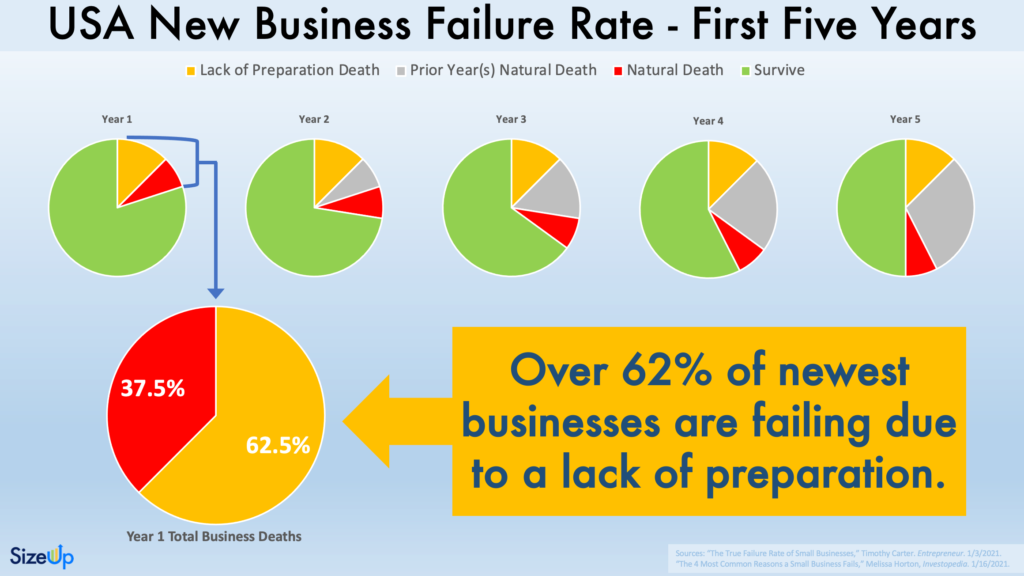
How Economic Developers Can Win in This Entrepreneurship Explosion
Here are four practical ways economic developers can help prepare businesses and reduce new business failure:
Online Research
In today’s information economy, businesses without access to information are at a much higher risk for failure. Preparation requires information, but entrepreneurs typically don’t have access, nor can they afford high quality market research. Many economic development organizations bridge this gap by providing local entrepreneurs with easily understandable market research based on big data, algorithm-based analysis, and super-computing, which is delivered on the EDO website using SizeUp technology. It is detailed by industry-specificity and is geographically relevant.
Entrepreneurs can use the software for free on their local EDO’s website to estimate the viability of their business and test assumptions of their business plan. In addition, they can use the software to discover potential customers, find local suppliers, and can optimize their marketing by targeting ideal customers.
The need from entrepreneurs to access this information and the demand from EDOs to deliver it to local businesses has resulted in rapid implementation by EDOs across the USA. In 2020 alone, over ¼ of the International Economic Development Council Board of Director organizations implemented SizeUp including Sacramento, Colorado Springs, Dallas, Tucson, Tulsa, Detroit, Atlanta, and Pflugerville (a suburban Texas city with a population of 61,737).
Online Training
Business education and training can be accessed from training platforms such as Udemy that provide thousands of courses for small business owners, managers, and entrepreneurs. Udemy has promoted itself as helping “organizations of all kinds prepare for the ever-evolving future of work.” Udemy is not a university and, instead, their instructors are “experts who stay active in their fields in order to deliver the most up-to-date content”.[7] Because courses on Udemy must be purchased, EDOs could consider allocating small business training budgets to subsidize the costs for local companies wanting to access this customized job training education.
Incubators
Incubators provide a physical location with shared services to help companies get started and become stable enough to venture into an independent location. They often reduce costs by having shared office resources such as telephone, internet, meeting rooms, and reducing initial capital investments in items such as copiers and office equipment. Some provide small business training to help the co-located tenants, which tend to be in similar situations in the early stage of their business and need to learn the basics of operating a business.
There is growing research about the potential ineffectiveness of incubators and whether they are simply self-serving.[8] If your organization has an incubator or is considering starting one, to be successful the initiative needs to have the adequate resources, staffing, mentors, and measurable metrics to make sure your incubator is adding value to your business ecosystem.
Real Estate Carnage
Many businesses, including many fancy companies in Class A office space and premium retail locations, have gone out of business permanently as a result of being unable to survive through the COVID-19 economic crisis. This has resulted in the abandoning of many quality real estate locations that have existing infrastructure which, in some cases, have tenant improvements which are high-end in A-level locations.
A new generation of entrepreneurs can take advantage by moving into these empty storefronts and office buildings without having to pay for these tenant improvements they might not have ever been able to afford and by leasing/buying business space that are in prime locations that might have never been available to them prior to the recession.
Unemployed to Entrepreneurs
Many skilled, talented, and experienced workers have been made unemployed during the COVID crisis as companies have closed and laid off workers. While some will switch companies or careers, other will think about starting the business they’ve always dreamed of opening.
The companies they open are more likely to be successful because companies launched during a downturn tend to be more durable and resilient than those started in a better economic time. Also, business models have changed for the long term as a result of COVID which is an opportunity to benefit from newly created market opportunities.
Economic developers can help transition unemployed workers to transition their skills and business experiences into a new direction of entrepreneurship by assisting them with the information and skills they need to start a new business.
Equity and Inclusion
Women, racial minorities, and the poor have been disproportionately damaged by the COVID-19 economic downturn. Women have lost more jobs, Blacks and Latinos have high unemployment, and lower-paid workers have lost the most jobs during the pandemic. Minority owned companies have also had to take more drastic steps to stay in business during the pandemic.
Racial minority and women-owned businesses lack parity with white and male ownership, which creates an opportunity to unleash underutilized talent and opportunity by expanding the numbers and success of these underrepresented groups through entrepreneurship. Related to this, minority and women-owned businesses are a growth segment.
- “From 1997 to 2002, the number of minority firms grew at a rate of 35 percent. By comparison, the number of non-minority firms grew at a rate of 6 percent.”[9] “From 2014 to 2016, the overall number of minority-owned employer businesses rose 11 percent, while the non-minority figure rose 1 percent.”[10] However minority-owned business growth is constrained by limitation including racism, education, funding, and market access.[11]
- “Between 2014 and 2019 the number of women-owned businesses increased 21%, while all businesses increased only 9%,” according to research by American Express. Women of color represent 39% of the total female population in the United States but accounted for 89% of the net new women-owned businesses in 2019.[12]
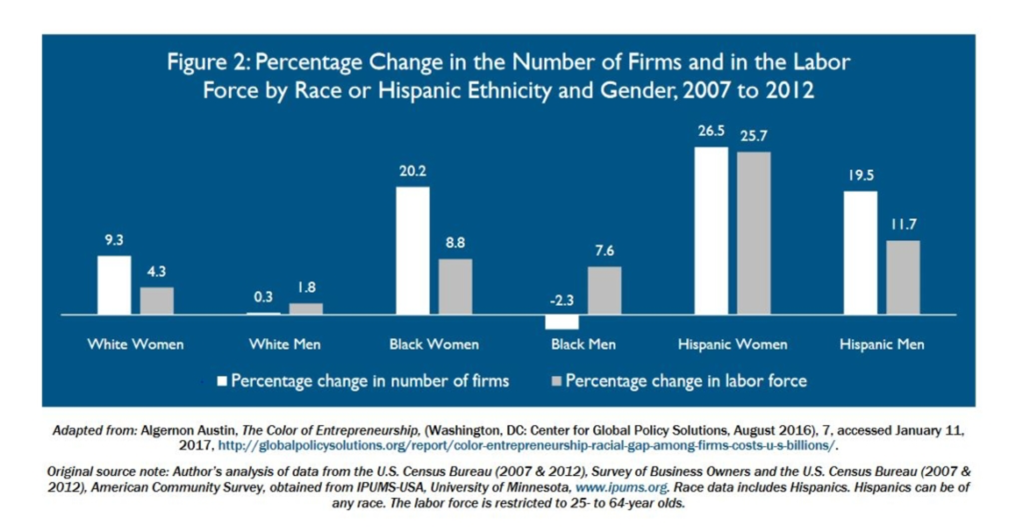
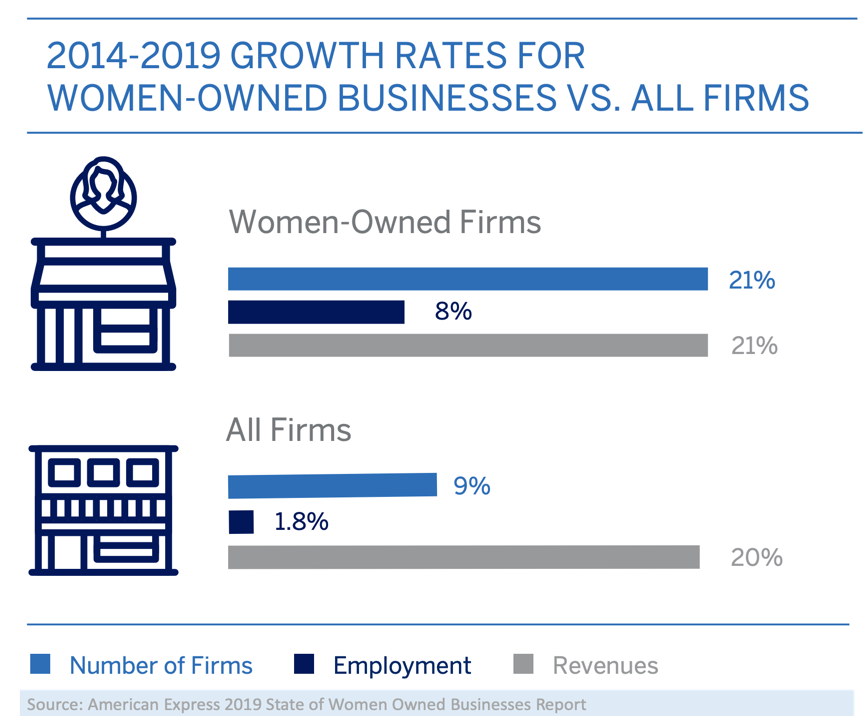
This Is the Opportunity You’ve Been Waiting For
Do you remember the good-old-days of entrepreneurship when new businesses were starting up in such record volumes it could transform your local economy for the better? Of course you do, because those good-old-days are the good-new-days of now.
Right now is the once-in-a-career economic opportunity you’ve been waiting for as an economic developer. If you miss engaging this unique occasion you may never see one like it again during your career.
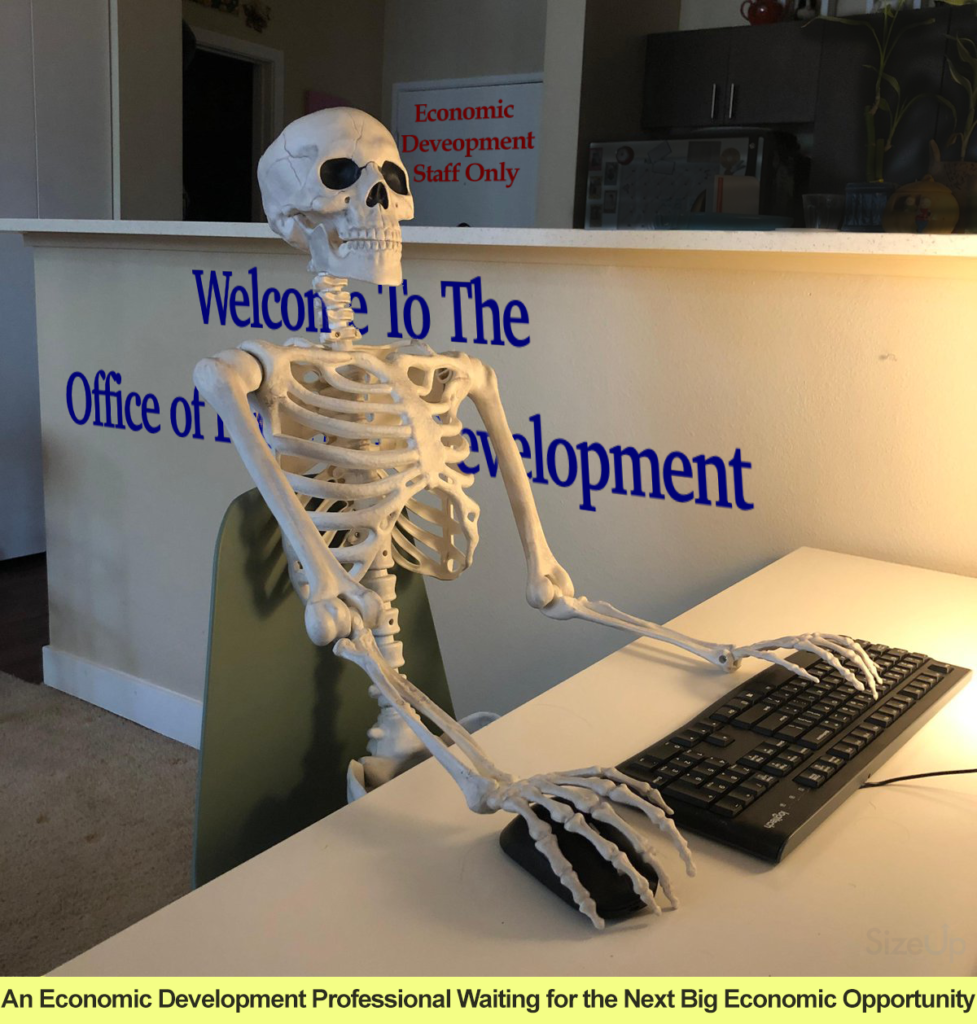
The good news for you is that you know this wave of entrepreneurship is real and big. As waves do, it has power and momentum which your EDO can surf for a long time if you paddle really hard to ride this wave now by implanting the programs to help aspiring local entrepreneurs to plan for, open, and operate their new companies.
This year the entrepreneurship wave is lifting the United States, but the biggest economic impact is really out on the horizon. You know it’s going to be growing. But unlike an actual ocean wave with surfers hoping the big wave will come sometime, this economic wave is precise. We already know it is bigger than anyone we’ve seen in over 15 years. We don’t know if it will get even bigger, but all the data indicates it will.
You have seen the data. You have looked at the trends. What do you predict? Will you be prepared to maximize this incredible economic development entrepreneurial opportunity by taking action now to support entrepreneurs with what they need to grow in your community?
Footnotes:
[1] “The New Reality of Economic Development,” Anatalio Ubalde and Jon Roberts. August 20, 2020.
[2] “The number of new businesses in America is booming: No other rich-world country is experiencing the same rise in entrepreneurship,” The Economist. October 10, 2020 edition.
[3] “Green Bay Chamber says new business registrations up 26% in 2020,” We Are Green Bay CBS Affiliate. February 19, 2021.
[4] United States Bureau of Labor Statistics. Table 7. Survival of private sector establishments by opening year.
[5] “The True Failure Rate of Small Businesses,” by Timothy Carter. Entrepreneur. January 3, 2021.
[6] “The 4 Most Common Reasons a Small Business Fails,” by Melissa Horton, Investopedia. January 16, 2021.
[7] Udemy About Us webpage. May 2019.
[8] Research from the Kauffmann Foundation shows that most incubators typically only have 2 employees but serve 25 businesses, on average. They question the plausibility that so few employees can impact so many companies. Kauffmann’s research also shows that there is little study or evidence that incubated companies out-perform unincubated companies. A dissertation from Alejandro Amezcua shows that incubated businesses have higher job creation and sales growth but lower survival rates after graduating, however, these variations were marginal.
[9] “Minority-Owned Businesses Face Critical Challenges,” Minority Business Development Agency, U.S. Deprtment of Commerce. October 2008.
[10] “Small Business Facts: Spotlight on Minority-owned Employer Businesses,” May 2019, Nora Esposito, Research Fellow. US Small Business Administration Office of Advocacy.
[11] “Minority-Owned Businesses: Beyond the Statistics,” Bentrends Financial. February 11, 2020.
[12] “The 2019 State of Women-Owned Businesses,” Commissioned by American Express.
Monthly data on New Business Starts
Data from January and February 2021 shows is that these two months have had the highest average number of new business starts compared to any other January or February in the past 15 years (maybe even much longer than that, but this is a sufficient period of time to recognize a unique trend). Compared to 2020, January had 62% growth of new businesses and February had 40% growth. What’s more, February 2021 had more new businesses started than January 2021 and February is a shorter month. Also, comparing to a year before, February 2020 was prior to the recession and before COVID-19.
